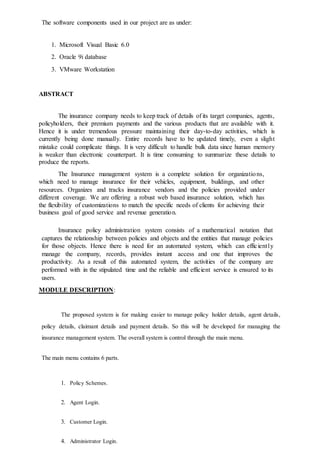Insurance management system
- 1. INSURANCE MANAGEMENT SYSTEM Teammembers Nithin K Sabu Nikhil Raj N U 5TH BCA INTRODUCTION Visual Basic is an interesting topic, which has different types. It has all the methods have their own features with each having merits and demerits which help in data processing. The topic includes their architecture representing the elements involved in it and their action is also specified. Visual Basic 6.0 allows creating object-oriented applications. Visual Basic 6.0 profoundly concentrates on the Internet development features, Active X technology, enhanced controls, enhanced features of existing control, client/server, new language features development, data access, a few design enhancement etc.,Relational databases are logical collection of inter-related data in tabular form relational databases have always been core to any management system. Its relevance is profound and hence the need to incorporate new functionalities, utilities becomes important. These are currently the predominant choice in storing financial records manufacturing and logistical information, personnel data and much more. Relational databases are used in huge management systems like Post Office, Banking, Railway, Defence Logistics. Databases pertaining to Educational Institutions and other large collection of related data. Relational databases have largely replaced hierarchical databases and network databases because they are easy to understand and use even though they are much less efficient. They have been however challenged by Object Databases and XML databases. The three leading commercial relational database vendors are Oracle, Microsoft, and IBM.The three leading open Source implementations are MySQL, PostgreSQL, and SQLite.
- 2. The software components used in our project are as under: 1. Microsoft Visual Basic 6.0 2. Oracle 9i database 3. VMware Workstation ABSTRACT The insurance company needs to keep track of details of its target companies, agents, policyholders, their premium payments and the various products that are available with it. Hence it is under tremendous pressure maintaining their day-to-day activities, which is currently being done manually. Entire records have to be updated timely, even a slight mistake could complicate things. It is very difficult to handle bulk data since human memory is weaker than electronic counterpart. It is time consuming to summarize these details to produce the reports. The Insurance management system is a complete solution for organizations, which need to manage insurance for their vehicles, equipment, buildings, and other resources. Organizes and tracks insurance vendors and the policies provided under different coverage. We are offering a robust web based insurance solution, which has the flexibility of customizations to match the specific needs of clients for achieving their business goal of good service and revenue generation. Insurance policy administration system consists of a mathematical notation that captures the relationship between policies and objects and the entities that manage policies for those objects. Hence there is need for an automated system, which can efficiently manage the company, records, provides instant access and one that improves the productivity. As a result of this automated system, the activities of the company are performed with in the stipulated time and the reliable and efficient service is ensured to its users. MODULE DESCRIPTION: The proposed system is for making easier to manage policy holder details, agent details, policy details, claimant details and payment details. So this will be developed for managing the insurance management system. The overall system is control through the main menu. The main menu contains 6 parts. 1. Policy Schemes. 2. Agent Login. 3. Customer Login. 4. Administrator Login.
- 3. POLICY SCHEMES:- Various policy schemes are:- 1. LIFE INSURANCE:- a) Whole life policy b) Term life policy c) Endowment policy d) Pension plans 2. GENERAL INSURANCE:- a) Home insurance b) Auto insurance c) Fire insurance AGENT LOGIN The agent login form links to- 1. Basic agent information like contact details and address which will be shown in customer insurance information window. 2. All the information related to insurances which he has made to his clients. 3. Commission received by him for each insurance made by him respectively. 4. Option to create a new policy to any existing/new client. 5. Option to edit the contact information of its client. 6. Option to delete a policy of any client in case of policy lapse. CUSTOMER LOGIN:- The form contains the agent information like- 1. Personal information required by insurance agency. 2. Nextpremium due of respective insurances by the client along with maturity date,agent info etc.
- 4. ADMINISTRATOR LOGIN:- Administrator has rights to- 1. Create new agent 2. Edit agent’s information and its commission percentage. 3. Delete an agent’s database and all its policies respectively. SYSTEM REQUIREMENTS:- Windows Platform (XP preferred). 512 MB DDR2 RAM. At least 5 GB HDD space FREE. Processor speed 1.7 Ghz or higher.






